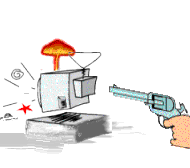
Death in the Internet Café
(page 3)
A word processor is just a typewriter with delusions of grandeur… |
Kerry Greenwood continues…
The publishers were muttering about typesetting from a disk. Oh no! A word processor? Me? Whom even bar-heater hated with impunity? Who can cause Windows to crash by walking into the room? Who with one hand and a bent coin or three can destroy a whole Supreme Court library full of photocopiers? To whom a thousand worried technicians have said, "I've never seen it do that before. What did you do to it?" "Nothing..."


 I asked around. What sort should I buy - IBM or clone or Mac? Everyone I knew burst into rather wounding howls of laughter and recommended a Mac. "It's designed for very small children, Kerry," they said soothingly. "You can't fail to understand it." I have had people say, "You can't fail to understand it" about the construction and repair of a differential gear, the theory of quantum mechanics and mutations in Irish Gaelic grammar and I have failed to understand all of them with insolent ease.
I asked around. What sort should I buy - IBM or clone or Mac? Everyone I knew burst into rather wounding howls of laughter and recommended a Mac. "It's designed for very small children, Kerry," they said soothingly. "You can't fail to understand it." I have had people say, "You can't fail to understand it" about the construction and repair of a differential gear, the theory of quantum mechanics and mutations in Irish Gaelic grammar and I have failed to understand all of them with insolent ease.
With fear, trembling and a special adviser, I bought a Mac Classic, to the sneers of the IBM etc. persons who told me it was too simple. I smiled. Hah! Too simple, eh? They hadn't seen me fuse a whole suburb trying to get a piece of toast out of the toaster.
I gave myself six months to learn to use the Mac. It took four hours. They had this magical little person called Mr Apple who explained it all and let me make fish swim around the fishbowl and open a filing cabinet drawers. It was incredibly simple, just like they said. It's got a desktop so I didn't have to learn anything at all about computers.

 He took the opportunity at my own publisher's party at the Bouchercon to nail me to the wall and demand to know why I had given him a bad review and what I didn't like about his writing and that I only hated his book because I was one of those rabid feminist Sisters in Crime who hated men and didn't think he could write about women. I was somewhat taken aback by this; seldom have my accusers managed so many inaccuracies in so short a space!
He took the opportunity at my own publisher's party at the Bouchercon to nail me to the wall and demand to know why I had given him a bad review and what I didn't like about his writing and that I only hated his book because I was one of those rabid feminist Sisters in Crime who hated men and didn't think he could write about women. I was somewhat taken aback by this; seldom have my accusers managed so many inaccuracies in so short a space!
 Published in Melbourne, Victoria, Australia
Published in Melbourne, Victoria, Australia